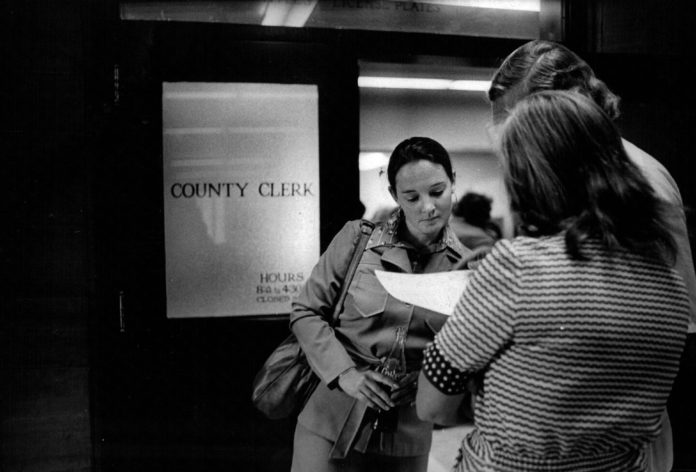
The cause was complications from a fall, said her son Scott Poston.
Ms. Rorex was 31 years old, a self-described “feminist who wore short skirts, had long hair and was a single parent,” when she won election as clerk of Boulder County in 1974. Three years earlier, ratification of the 26th Amendment had lowered the voting age to 18 from 21, and Ms. Rorex campaigned on a platform of making it easier for citizens, especially newly enfranchised students at the University of Colorado, to cast their votes. But it was another issue that would dominate her short time in office and propel her to national attention.
In early 1975, just a few months into her tenure, two men, David McCord and David Zamora, reported to Ms. Rorex’s office seeking a marriage license. They had failed in an earlier effort to obtain one in Colorado Springs and hoped for greater success in the university town that was the seat of Boulder County. “We don’t do those kinds of things here,” they had been told in Colorado Springs. “Go to Boulder.”
Ms. Rorex consulted Assistant District Attorney William Wise, who informed her that marriage laws in Colorado were gender-neutral, apparently because legislators had not anticipated petitions for unions other than those between a man and a woman. “If you want to go ahead and issue a license, you’d be within your legal right to do so,” she recalled him saying. “It’s your decision.”
Ms. Rorex granted the license on March 26, 1975.
“Forty years before the Supreme Court announced a right to same-sex marriage in 2015, Clela Rorex essentially announced a right to same-sex marriage and used that right to grant same-sex marriage licenses,” Jason Pierceson, a professor of political science at the University of Illinois at Springfield and the author of the book “Same-Sex Marriage in the United States,” said in an interview. “It really was a very innovative and courageous decision, far ahead of its time.”
Ms. Rorex was not the first county clerk to grant a marriage license to a same-sex couple; other licenses had been issued but not recorded, in some cases by clerks who did not realize that both applicants were of the same sex. But the license issued by Ms. Rorex represented “the first time in American history that a clerk had knowingly issued an official marriage license to an openly lesbian or gay couple that was used in a marriage which was later officially recorded,” according to the book “Marriage Equality: From Outlaws to In-Laws” by William N. Eskridge Jr. and Christopher R. Riano.
“What you have here is … courage and conviction in what she saw was the right thing to do,” Riano, a lecturer in constitutional law and government at Columbia University, said in an interview, describing Ms. Rorex as an “unsung hero” in the marriage equality movement.
Ms. Rorex’s decision made national news and brought about what she described as a “furor.”
“It was horrendous,” she told the San Francisco Chronicle in 2004. “I got volumes of hate mail. I got mail from entire church congregations … saying I was creating a Sodom and Gomorrah.”
At one point, a cowboy who by his own admission had consumed half a bottle of Johnnie Walker Black Label Scotch whisky pulled up at the Boulder County clerk’s office and announced, in a dramatic protest of Ms. Rorex’s position, that he wished to marry his horse, Dolly.
“We need tolerance,” he was quoted as saying, “but good tarnation, there’s such a thing as taking it too far.”
Ms. Rorex outwitted the man when she began taking down the vital information of the applicants in question, as she did for any couple. “And how old is Dolly?” she inquired. The cowboy replied that the horse was 8. Ms. Rorex recalled years later in an interview for NPR’s StoryCorps series, “I put my pen down, calm as could be, and said, ‘Well, I’m sorry, but that’s too young without parental approval.’ ”
According to Eskridge and Riano’s account, Colorado Attorney General J.D. MacFarlane ultimately issued an opinion that state law did not permit the issuance of same-sex marriage licenses. The opinion did not strictly bar Ms. Rorex from granting more of them, but she concluded she had little choice but to stop. She left the county clerk’s office roughly halfway through her four-year term and moved to California to marry her second husband.
“I always stood by my actions,” she told Esquire magazine in 2016. “I never backed away from them. But I did not see out my term in office, because I knew I was going to get recalled.”
In total, Ms. Rorex granted marriage licenses to six gay and lesbian couples. One of them was Anthony Sullivan and Richard Adams. Sullivan was an Australian citizen facing deportation, and he and Adams hoped to use a marriage license to help him obtain a spousal visa to remain in the United States.
They were denied, and received from the U.S. immigration service a letter that reveals the degree of vitriol gay couples faced at the time. “You have failed,” the letter read, “to establish that a bona fide marital relationship can exist between two faggots.”
Although they lost their ensuing lawsuit, The Washington Post reported, their case represented the first time a federal court was petitioned to recognize a same-sex marriage. And years later, the U.S. Citizenship and Immigration Services would apologize for the language used in the letter.
The campaign for marriage equality continued until the Supreme Court ruled in Obergefell v. Hodges in 2015 that due process protections of the Constitution guaranteed a right to same-sex marriage. Adams by then had died, but Sullivan, the Sydney Morning Herald of Australia reported, was finally granted a green card as his widower. Sullivan died in 2020.
Clela Ann Rorex was born in Denver on July 23, 1943. Her mother was a schoolteacher and a dance instructor. Her father, who lost his leg saving his father’s life in a mining accident, served for 30 years as clerk of Routt County, Colo., where Ms. Rorex grew up in the county seat of Steamboat Springs. The couple had adopted Ms. Rorex when she was a baby. Her son attributed her sensitivity to those who struggle in life in part to her experience as an adoptee, as well as to the difficulties she saw her father face because of his disability.
Ms. Rorex received a bachelor’s degree from the University of Colorado at Boulder in 1973. After her interlude in California, she returned to her home state and received a master’s degree in public administration from the University of Colorado at Denver in 1981. She later worked for organizations including the Multistate Tax Commission and the Native American Rights Fund.
Her marriages to Bob Poston, Leo Warmolts and Joe Russell ended in divorce.
Survivors include a son from her first marriage, Scott Poston of Rico, Colo.; a son from her third marriage, Aron Rorex of Bethel Island, Calif.; a daughter she placed for adoption and with whom she was later reunited, Linda Young-Vap of Atwood, Kan.; and a brother.
Ms. Rorex said that when she first granted a same-sex marriage license, she did not know anyone who was openly gay, nor had she given much thought to the gay rights movement that had been galvanized by the Stonewall riots in New York in 1969. She said she simply saw the petition as a matter of legal rights, not unlike the ones she fought for on behalf of women as a feminist.
“[It was] a question of, am I going to be the one to take away such a right if this right exists?” Ms. Rorex said in a 2015 interview with the radio station WNYC. “And I could never have lived with that.”








